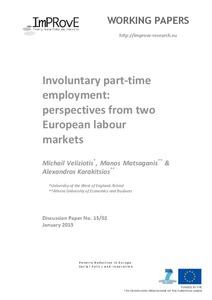Involuntary part-time employment: perspectives from two European labour markets
"Part-time employment in Europe has continued to grow faster than overall employment during the Great Recession and its aftermath. But as part-time work becomes more prevalent, so does involuntary part-time – at least in most countries. In this paper we focus on Greece and the UK, two European...
| Main Authors: | , , , |
|---|---|
| Institution: | ETUI-European Trade Union Institute |
| Format: | TEXT |
| Language: | English |
| Published: |
Antwerp
2015
ImPRovE |
| Subjects: | |
| Online Access: | https://www.labourline.org/KENTIKA-19115401124919336839-involuntary-part-time-employme.htm |
| Summary: | "Part-time employment in Europe has continued to grow faster than overall employment during the Great Recession and its aftermath. But as part-time work becomes more prevalent, so does involuntary part-time – at least in most countries. In this paper we focus on Greece and the UK, two European labour markets characterised by different institutions, but also a common trend of rising involuntary part-time (from different levels). We attempt to detect determinants and/or correlates of involuntary part-time, and changes over time. We analyse Labour Force Survey data for 2008 and 2013. We find that the UK labour market appears to be more successful in aligning workers’ preferences with employers’ demand for part-time work. However, as the economic downturn has made full-time jobs scarcer, involuntary part-time work has risen. Moreover, significant gaps in pay and job quality between voluntary and involuntary part-timers persist. In the case of Greece, involuntary part-time was already very high in 2008, in spite of the fact that pay differentials were relatively small, which suggests that part-time jobs were widely viewed by workers as sub-optimal. Under the impact of the recession and the austerity, the Greek labour market has become more flexible but also more insecure. As pay differentials have risen, and non-standard work has been made more precarious, part-time jobs have become even less attractive, so involuntary part-time has grown further still. We conclude that while the structure of the economy and the business cycle explain some of the differences between the two countries and over time, institutional factors and the quality of part-time jobs on offer are of great importance in shaping workers’ attitudes. We suggest that future research should focus on the interaction between shocks and institutions." |
|---|---|
| Physical Description: | 27 p. Digital |

